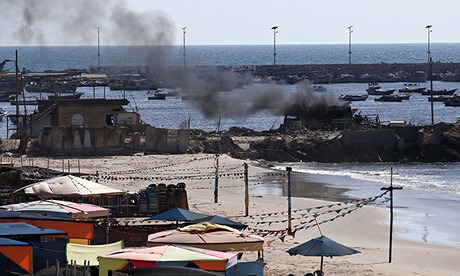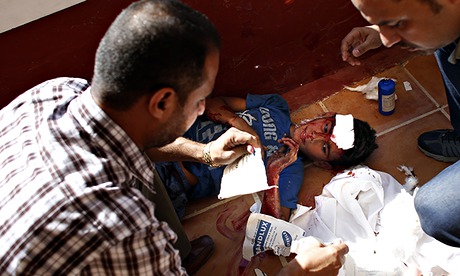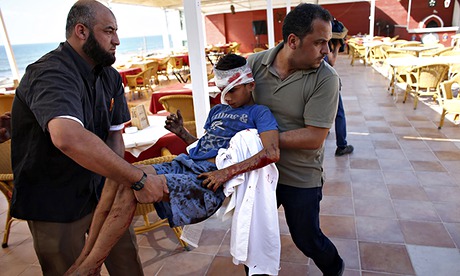NOVANEWS

They waved and shouted at the watching journalists as they passed a little collection of brightly coloured beach tents, used by bathers in peacetime.

Three others who were injured made it to the hotel: Hamad Bakr, aged 13, with shrapnel in his chest; his cousin Motasem, 11, injured in his head and legs, and Mohammad Abu Watfah, 21, who was hit by shrapnel in his stomach.
A man who had been near them reached the hotel terrace first, scrambling up a steep sandy bank. A skinny man in his 30s, he groaned and held up a T-shirt already staining red with blood where he was hit in the stomach. He fainted and was carried to a taxi waved down in the street as he grew pale and limp.
The children were brought up next. Pulling up the T-shirt of the first boy, journalists administering first aid found a shrapnel hole, small and round as a pencil head, where he had been hit in the chest. Another boy, a brother or cousin, who was uninjured, slumped by the wall, weeping.

The Islamist group Hamas, which controls Gaza, on Wednesday formally rejected Egypt’s ceasefire proposal that had been accepted by Israel to end the nine-day-old conflict that has left at least 213 Palestinians and one Israeli dead. In a text message to the Associated Press, a senior Hamas figure, Sami Abu Zuhri, said: “We informed Cairo today officially that we don’t accept the proposal they made.”
He added that Hamas felt “alone in the field” with little support from the Arab world and called on the Palestinian president, Mahmoud Abbas, of the rival Fatah faction in the West Bank, to support Hamas’s refusal of the ceasefire deal.
Diplomatic sources told the Guardian that they did not believe that a serious new ceasefire proposal was likely to emerge for several days and, even then, securing a deal looked very difficult.
Hamas’s rejection came as an Israeli official said Israel’s defence minister had asked prime minister Binyamin Netanyahu’s security cabinet to authorise the mobilisation of another 8,000 reserves. The military has said about 30,000 reservists have been called up since the Israeli offensive began last week.
Israeli experts have been predicting in recent days that any ground attack, which Israel has threatened, may involve overland raids in the Gaza Strip to destroy command bunkers and tunnels that have allowed the outgunned Palestinians to withstand air and naval barrages and keep the rockets flying. Hamas continued to fire dozens of rockets into Israelon Wednesday.

Alongside the air strikes, Israel told tens of thousands of residents of the northern town of Beit Lahiya and the Zeitoun and Shujai’iya neighbourhoods of Gaza City– all near the Israel border – to evacuate their homes by 8am. The warnings came by automated phonecalls, texts and leaflets dropped from planes.
The Israeli military said in its message that large numbers of rockets were being launched from these areas and that Israel planned to bomb these locations.
“Whoever disregards these instructions and fails to evacuate immediately endangers their own lives, as well as those of their families,” the message said.
At the Shifa hospital on Wednesday afternoon, Hamad Bakr was conscious and waiting for surgery to remove the shrapnel from his chest and drain fluid from his chest cavity. “My father has a fishing boat there. We were playing hide and seek when we were hit. I didn’t hear the first one which killed one of us but I heard the second as we were running along the beach. That one killed three more.”
His mother Taghrid, 35, came into the room. “Why did you go out of the door?” she demanded of Hamad.
She said that his brother, Younis, who was with Hamad, while he was being treated, “is so scared that he is shaking”.
Suddenly angry and grief stricken, she said: “They killed my nephew. Who does that? Who fires on children?”
As the reporters left, Mohammad Abu Watfah was wheeled out of a lift after surgery to remove the shrapnel in his stomach. As relatives gathered not far from the Al-Deira hotel to bury the four dead boys, barely 90 minutes after the attack on the beach, the boys’ uncle, Abdel Kareem Baker, 41, said: “It’s a cold-blooded massacre. It’s a shame they didn’t identify them as kids with all of the advanced technology they claim they’re using.”



